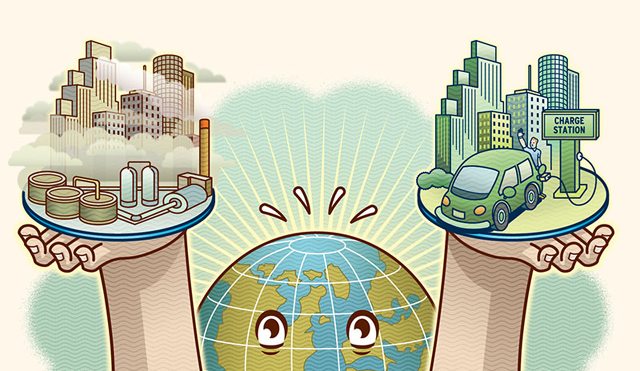sierraclub.org - sierra magazine - march/april 2011 - grapple: as the world warms
Scientists Fight Back | Spiraling Down | Woe Is Us | As the World Warms | A Short History of the Nose |
Up to Speed
AS THE WORLD WARMS
Quick thinking before we slowly fry
We know organic milk is better for people, and now we find it's better for the climate as well. A new study shows that organic dairy farms produce 60 to 80 percent fewer methane emissions than their conventional counterparts. Credit better (i.e., less gaseous) feed on the front end and better management of what comes out the back end. Given that 8 percent of U.S. methane emissions come from dairy farms, that's nothing to burp at.
As planetary temperatures soar and water supplies dwindle, many of the world's food crops are expected to shrivel. But breeders at India's International Crops Research Institute for the Semi-Arid Tropics are using their farming expertise in hot, dry regions to breed "climate change-ready cultivars" of peanuts, chickpeas, sorghum, and pearl millet. The new varieties can handle salty soils and scarce water and can set seed even at temperatures above 107 degrees Fahrenheit.
There are more than 2.7 million miles of paved road in the United States, and they can reach temperatures above 140*F on a blistering sunny day. To tap into that energy, engineering researchers from the University of Rhode Island are exploring embedding solar cells in roads and concrete traffic barriers, which could power streetlights and signs—and even melt road ice. —Dashka Slater

Peter and Maria Hoey
ON THE ONE HAND . . .
Home to 497 industrial facilities, including one of the nation's largest oil refineries, Houston already has some of the worst air quality--and the highest carbon emissions--in the nation. And the situation may get worse. A company called TransCanada is planning a pipeline that will bring 500,000 barrels of dirty tar-sands oil each day to Houston for refining. Producing a barrel of tar-sands oil leads to three times as many greenhouse-gas emissions as producing conventional crude. It also contains 11 times more sulfur and nickel, 6 times more nitrogen, and 5 times more lead.
ON THE OTHER . . .
Houston is the largest municipal purchaser of green power in the nation, with 34 percent of its total electricity derived from wind. Power plant giant NRG Energy plans to give Houston even more green cred by building the nation's first electric-car charging network. Called eVGo, the network will consist of 50 to 150 "freedom stations," where monthly subscribers can plug in for fast volts. The sprawling, 640-square-mile metropolis is ideal for such a network, because currently local cars guzzle 4.3 million gallons of gas a day.—D.S.
A Short History of the Nose